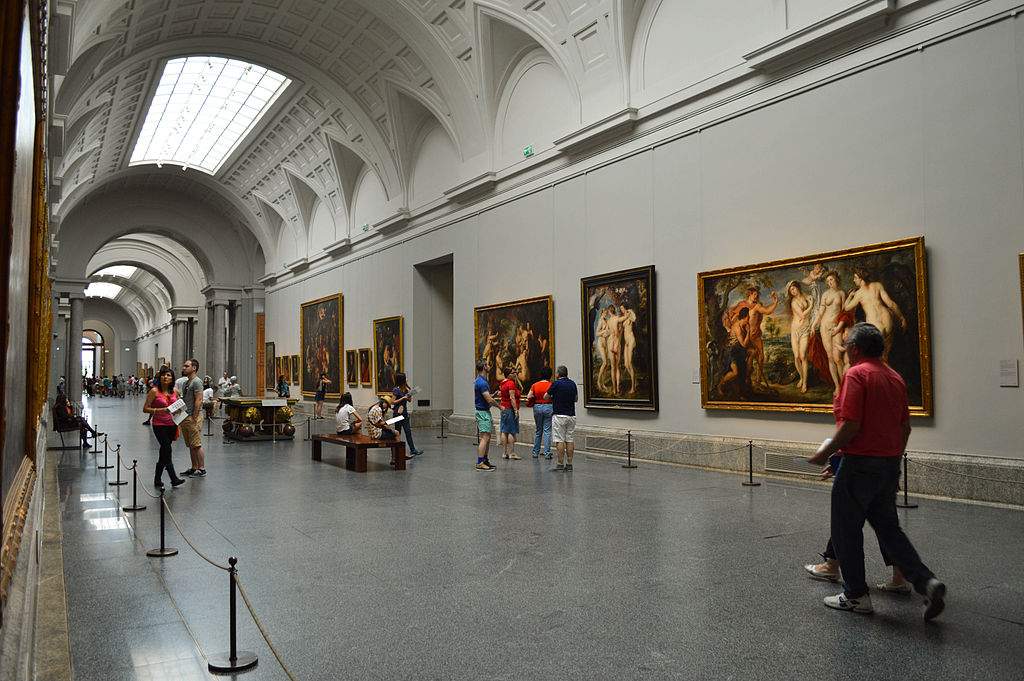Spain, here are strict measures to reopen museums: distances, no teaching, audio guides banned
As we wrote in this morning’s article, on Monday Spain will reopen museums in regions eligible for the second phase of the containment of the Covid-19 coronavirus pandemic (for Spain, which began with “phase 0,” it will therefore be a matter of moving to “phase 1”). The regions that will be able to open museums will be Galicia, Asturias, Cantabria, the Basque Country, La Rioja, Navarre, lAragon, lEstremadura, the Murcia region, the Canary Islands, the Balearic Islands, and the extraterritorial cities of Ceuta and Melilla. Official security measures to which museums will have to adhere have just been published, with an order from the Ministry of Health included today in the BoletÃn Oficial del Estado, the Spanish Official Gazette.
It begins with general provisions for workers in all areas covered by the ordinance (so museums are also included). Facility employees will have to have soap and water or hydroalcoholic gels or disinfectants with virucidal action authorized by the ministry on hand washing at all times. Workers should also maintain an interpersonal safety distance of two meters between them at all times: if this is not possible, they should be provided with personal protective equipment appropriate to the level of risk. In the latter case, personnel will have to be properly trained and informed on their proper use. Time control systems that involve contact will have to be replaced (or, if not possible, they will have to be frequently disinfected), and work shifts will have to be organized in such a way that staff can remain at a safe interpersonal distance. In the event that a worker develops symptoms consistent with those of Covid-19, an appropriate regional telephone number will need to be contacted, and the worker will be required to leave the workplace until his or her medical situation is evaluated by a physician. Careful disinfections of contact surfaces (door knobs, handles, tables, furniture, handrails, telephones and other frequently touched objects) are then prescribed. Again, regular ventilation of the premises must be ensured, at least once a day and at least for five minutes.
Museums will be allowed to open on the condition that they limit their capacity to one-third of what they can usually accommodate, and will still have to ensure the protection of workers and visitors: they will be able (it is not mandatory) to modify the visiting routes, separate entrance and exit, or exclude to the routes the rooms that do not allow to maintain the interpersonal safety distance. Only visits will be allowed: thus no cultural activities or educational activities will be allowed. The use of tactile materials will also be inhibited, and no audio guides, handouts or similar materials will be allowed. Group visits will also be banned: the only visits allowed will be on an individual basis, or will be allowed for those who live together (families or cohabitants), as long as the two-meter intepersonal distance is always respected by any visitor (to facilitate this, museums will have to apply special stickers on the floor or similar devices to mark distances in access and waiting areas).
To ensure visitor numbers appropriate for the new capacity, museums will need to carefully control both on-site and online ticket sales. Museums will be able to set the maximum number of tickets to be sold on an hourly basis. The Ministry of Health still recommends online ticket sales. Checkroom service will also be disabled (however, it is not specified whether visitors with bulky backpacks or the like will be prevented from entering).
Museums will also set up dispensers of hydroalcoholic gels or disinfectants for visitors. Instead of flyers, which will not be allowed to be used, museums will install informational signs. Museums will then be required to regularly inform visitors about mandatory hygiene measures during the visit, and will have to ensure constant cleaning and disinfection, while at the same time making sure that historical surfaces or works of art are treated only with appropriate products. Cleaning will also have to be reserved for display case windows.
The document also includes measures for libraries: in addition to hygienic measures similar to those for museums, there will be “quarantine” for books, lasting fourteen days after use (during this period, no one will be allowed to consult them).
Pictured: interior of the Prado Museum. Ph. Credit Francisco Anzola
 |
| Spain, here are strict measures to reopen museums: distances, no teaching, audio guides banned |
Warning: the translation into English of the original Italian article was created using automatic tools. We undertake to review all articles, but we do not guarantee the total absence of inaccuracies in the translation due to the program. You can find the original by clicking on the ITA button. If you find any mistake,please contact us.




























